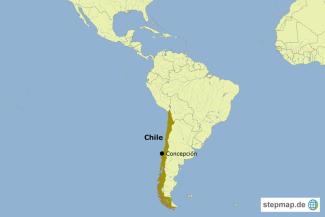Chile
Concepción in lockdown

Concepción is about 500 kilometres away from Santiago, the capital, and is the most important city in the southern part of the country. It lies on the Biobío River, which forms the border to the indigenous territories of the Mapuche, and has both major strategic as well as symbolic significance. It is considered the antithesis of Santiago.
The differences, political and otherwise, between the two metropolises are likely the reason why the Ministry of Health has placed Concepción under quarantine, which means that people may only leave their homes for important reasons. At least that is what the residents believe, having completely lost faith in the responsible members of government.
In June, the mayor of Recoleta, who belongs to the opposition, took legal action against President Sebastián Piñera and the Minister of Health at the time, Jaime Mañalich, who was responsible for the pandemic response. In the course of the investigation, it has recently become known that the Ministry of Health attempted to manipulate the official Covid-19 mortality figures.
Shortly before the Chilean Independence Day on 18 September, the new Minister of Health, Enrique Paris, decided to allow family gatherings. The mayor of Concepción, who is himself a government official, criticised the move publicly by pointing out that Paris's policy contradicted the general order to isolate. Following heated discussions in the media, Paris withdrew his permission. Relations broke down even more after that.
In Concepción, like in the rest of the country, it is difficult to follow the Covid-19 guidelines. Political squabbling, social tensions and a lack of clear communication have contributed to Chile's unsettling situation: the country of 19 million has registered around 17,500 deaths in connection with the pandemic.
The places where curfews are in place today experienced mass demonstrations one year ago. These began in October 2019 in Santiago as a protest against an increase in the price of metro tickets and ended as a popular uprising that swept the entire country and also resulted in violence and human-rights abuses (see Katie Cashman in D+C/E+Z e-Paper 2020/01, Debate section).
This social uprising forced those in government to clear the way for a new constitution. The current constitution is a relic of the dictatorship of Augusto Pinochet. On 25 October, a referendum will be held to ask voters whether a new constitution should be drafted.
Polls indicate that the majority favours change. Questions remain, however, with regard to voter participation. While election authorities have put guidelines in place to protect voters, many people are wary of gatherings where they could be infected. In Concepción, they are also wondering whether the quarantine will be lifted before the referendum, or whether it will proceed under the current restrictions. The latter situation could call the legitimacy of the election into question.
Javier A. Cisterna Figueroa is a journalist living in Concepción.
cisternafigueroa@gmail.com








